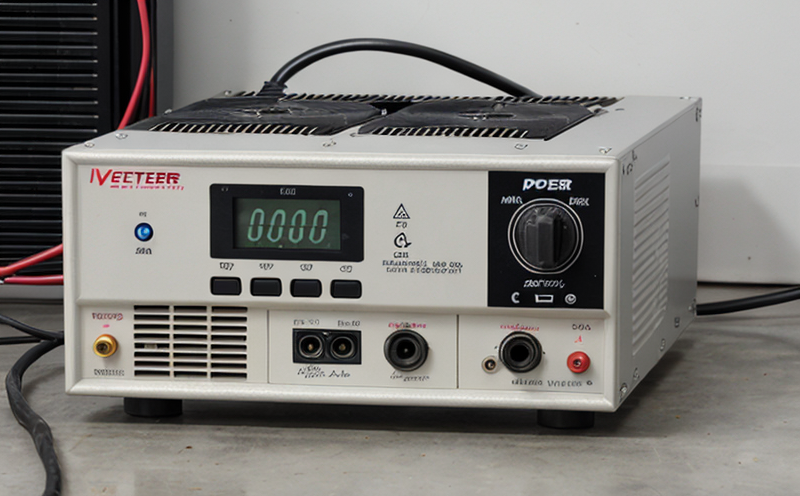IEEE 519 Harmonic Distortion Compliance Testing
The IEEE Standard 519-2014 addresses issues related to voltage total harmonic distortion (VTHD) and current total harmonic distortion (CTHD) for electric power supplied by public power utilities. This standard aims to ensure that electrical equipment connected to the utility grid does not introduce excessive harmonic distortion into the supply, thereby protecting other users of the system from potential interference or damage.
Inverters and power electronics devices are critical components in modern renewable energy systems, including wind farms, solar power plants, and hybrid systems. These devices convert variable voltage, frequency AC sources to standard 60 Hz utility-grade AC. Compliance with IEEE 519 is essential for ensuring that these inverters do not cause excessive harmonic distortion on the grid. This ensures stable operation of the grid and prevents issues such as overheating, reduced efficiency, and potential failure in other connected devices.
Our laboratory adheres strictly to this standard during testing procedures. We use state-of-the-art equipment capable of generating and measuring harmonics down to the 3rd harmonic. Our setup includes a power quality analyzer that can accurately measure voltage and current waveforms, allowing us to assess compliance with IEEE 519 standards effectively.
During our testing process, we first ensure the integrity of the specimen by verifying all connections and configurations according to manufacturer specifications. Once prepared, we perform harmonic distortion analysis using specialized software tools that compare measured data against predefined thresholds outlined in IEEE 519-2014. If any discrepancies are found, corrective actions can be identified immediately.
The importance of this testing cannot be overstated, particularly given the growing reliance on renewable energy sources. Non-compliance with these standards could lead to significant financial penalties, reputational damage, and operational disruptions for both manufacturers and utilities alike. By providing accurate and reliable compliance assessments early in the product development cycle, our service helps clients avoid costly rework or redesign efforts later down the line.
Compliance testing also plays a crucial role in ensuring safety standards are met across various industries relying heavily on electrical infrastructure. For instance, in offshore wind farms where even minor fluctuations can disrupt operations or pose risks to personnel working at sea, adherence to IEEE 519 ensures reliable performance under all conditions.
Furthermore, compliance with such internationally recognized standards enhances the reputation of manufacturers and helps build trust among end-users who value high-quality products. It demonstrates a commitment to best practices in design, manufacturing processes, and quality assurance throughout the supply chain.
Scope and Methodology
The scope of IEEE 519 Harmonic Distortion Compliance Testing covers the measurement and evaluation of harmonic distortion levels within specified frequency ranges for both voltage and current waveforms. Specifically, it focuses on third through fifth harmonics as they are most likely to cause issues in modern electrical systems.
Our methodology involves several key steps: - Specimen preparation: Ensuring all connections and configurations adhere strictly to manufacturer guidelines. - Data acquisition: Using advanced power quality analyzers to capture detailed waveforms of both voltage and current. - Analysis: Comparing acquired data against IEEE 519-2014 thresholds for harmonic content up to the fifth harmonic.
For each measurement, we provide a comprehensive report detailing the results along with recommendations for any necessary adjustments based on our findings. Our aim is not just compliance but also continuous improvement towards optimal performance.
Eurolab Advantages
At Eurolab, we pride ourselves on offering unparalleled expertise and precision when it comes to IEEE 519 Harmonic Distortion Compliance Testing. Our team comprises seasoned professionals with extensive experience in the field who stay updated with the latest developments regarding industry standards.
We offer several key advantages: - State-of-the-art equipment: Utilizing cutting-edge technology ensures accurate measurements and reliable results. - Rigorous quality control: Every measurement undergoes multiple checks to minimize errors and ensure consistency. - Tailored solutions: Understanding the unique requirements of each client allows us to customize our services accordingly.
Our commitment to excellence extends beyond mere compliance; it includes proactive measures aimed at preventing issues before they arise. By providing detailed insights into potential areas for improvement, we empower clients to make informed decisions that enhance overall product quality.
International Acceptance and Recognition
IEEE 519 Harmonic Distortion Compliance Testing is widely recognized across the globe as an essential component of ensuring reliable operation of electrical systems. Its acceptance by international standards organizations underscores its importance in maintaining grid stability.
The standard has been adopted by numerous countries and regions including North America, Europe, Asia-Pacific, and Africa. Many national regulatory bodies incorporate IEEE 519 requirements into their own guidelines, further emphasizing its relevance worldwide.
Our laboratory is accredited to conduct tests according to this standard, ensuring that our clients receive results aligned with international expectations. This global recognition enhances the credibility of your products in markets across continents, fostering greater trust among buyers and stakeholders alike.





